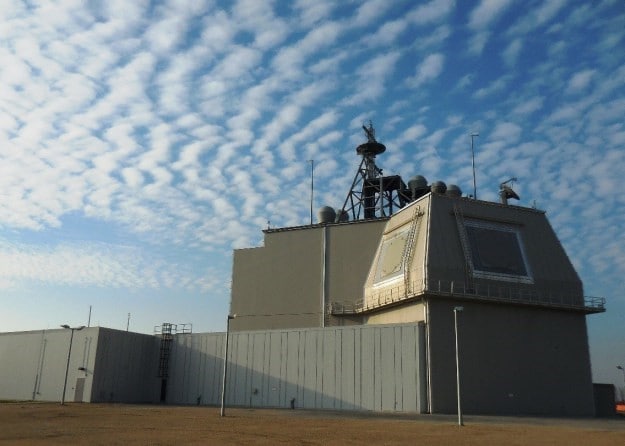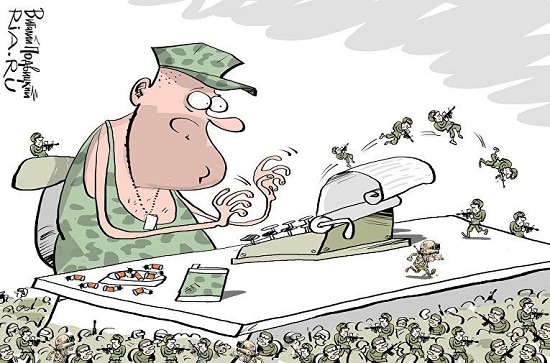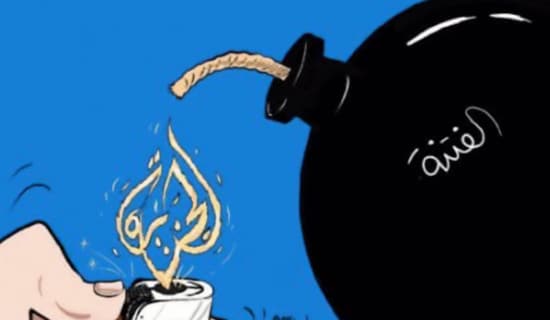Russia-NATO Update is a new monthly review by the MEMRI Russian Media Studies Project, covering the latest news on Russia-NATO relations from the Russian and East European media.

Quote Of The Month:
State Duma Foreign Affairs Committee head Alexey Pushkov: "In our confrontation with NATO our advantage is that we have a clear mind, while the other side is clearly paranoid." (Lenta.ru, May 17)
Russian Reactions To Negotiations On Montenegro's NATO Membership
On May 19, the foreign ministers of NATO member states signed an accession protocol for Montenegro, granting it observer status at NATO meetings. The signing ceremony, which was attended by Montenegro's Prime Minister Milo Djukanovic, took place at a North Atlantic Council (NAC) session in Brussels. The next step is that Montenegro will be granted membership in NATO once the accession protocol is ratified by all 28 NATO member states.
(See MEMRI Special Dispatch, Russian Reactions To Negotiations On Montenegro's NATO Membership, May 20, 2016)
State Duma vice-speaker Sergei Zheleznyak said: "Montenegro's accession to NATO demonstrates once again the U.S. and its European allies' pressure on a country [emphasis added], which has a sovereign right to conduct an independent foreign policy and defend its own national interests. Montenegro...is being dragged into NATO, despite the fact that the majority of the population wants to hold a referendum on the issue."
(Ria.ru, May 24)
Russian Security Council Deputy Secretary Yevgeny Lukyanov assessed that Montenegro's accession to NATO would not pose additional military risks to Russia.
(Interfax.ru, May 23)
Russian Foreign Ministry spokesperson Maria Zakharova said: "The continued efforts to draw [Montenegro] into the [NATO] alliance are based on secret agreements [emphasis added] that have been signed with the Montenegrin leadership with disregard for the peoples' opinion and in violation of democratic principles and procedures, the commitment to which NATO claims to honor so strictly...This latest NATO move - undertaken to change the military and political landscape in Europe, especially in light of the bloc's declared policy of containing Russia - will definitely affect Russia's interests and force us to react [emphasis added]." (Mid.ru, May 19, 2016)
Russia is also trying to support opposition parties to stop NATO's expansion. The Russian newspaper Kommersant reported that Russia's ruling United Russia party has signed a declaration with the head of Montenegrin People's Democratic Party (PDP), Milan Knezevic, and the head of Montenegrin People's Socialist Party (PSP), Srđan Milić. The declaration affirms the will to establish neutral states in South-East Europe (Serbia, Montenegro, Macedonia, and Bosnia and Herzegovina), and have Kosovo reincorporated in Serbia. This decision also appears motivated by Serbian disinterest in joining NATO's, although Belgrade is part of NATO's Partnership for Peace program. The declaration states further that the neutrality of Serbia, Montenegro, Macedonia, and Bosnia and Herzegovina should be guaranteed by both Russia and NATO. It is worth noting that the PDP opposes a dialogue with the Montenegrin authorities and favors changing the government. In October 2015, Milan Knezevic headed a 5,000 man protest march on parliament to demand the resignation of Montenegro's Prime Minister Milo Djukanovic and the scheduling of immediate elections.
(Kommersant.ru, May 10; Sputniknews.com, March 9, 2016)

Russian Reactions To The "Aegis Ashore" Missile Defense System Deployment In Romania
On May 12, 2016, the NATO's "Aegis Ashore" ballistic missile defense system became operational at a U.S. naval support facility in Deveselu, Romania. The day after, on May 13, the construction of another ballistic-missile defense site officially started in Redzikowo, Poland. Aegis Ashore was first announced by U.S. President Barack Obama in 2009, as part of the European Phased Adaptive Approach (EPAA) aimed at defending Europe against ballistic missile threats originating from outside the "Euro-Atlantic Area."
The deployment of NATO's missile defense base in Romania prompted strong criticism in Russia.
(See MEMRI Special Dispatch, Official Russian Campaign Against NATO's Ballistic Missile Defense System in Europe - Part I, May 16, 2016. See also MEMRI Special Dispatch, Official Russian Campaign Against NATO's Ballistic Missile Defense System In Europe - Part II, May 17, 2016; See also MEMRI Videoclip, Anger in Russian Media at U.S. Missile Defense System in Romania NATO Base - Military Expert Talks about Possibility of Use of Tactical Nuclear Weapon against System, May 10-16, 2016)
Russian Permanent Representative to NATO Alexander Grushko said, "Making the Deveselu base operational is another step in the series of measures creating considerable risks to the Russian Federation's security."
(Tass.ru, May 12)
TASS reported that Russian Deputy Foreign Minister Sergey Ryabkov said that the U.S. is finding artificial arguments to substantiate the necessity for a missile defense system. "For the Russian Federation, a situation where medium-range ballistic missiles are employed against targets in Europe is unthinkable. This can only be carried out by terrorists, who by definition are incapable of possessing such weapons and controlling them," Ryabkov said.
(Tass.ru, May 5)

Aegis Ashore site in
Romania. (Source: US. Missile Defense Agency)
Russia's Comments On Soltenberg's Remarks On Organizing A NATO-Russia Council Meeting Prior To The NATO Summit In Warsaw
Russian Foreign Minister Sergei Lavrov commented on NATO Secretary General Jens Soltenberg's remarks regarding a "broad agreement" that NATO should convene a new meeting of the NATO-Russia Council before the NATO summit assembles in Warsaw next July. Lavrov said: "On what grounds did [Soltenberg] say that? The Russia-NATO council acts as a result of a consensus. If they want to discuss this - they should discuss this with us and not reach out for a microphone." The Russian Federation's Permanent Representative to NATO Aleksander Grushko also criticized Soltenberg's remarks. Grushko said: "As of now, we have not received any official request...No consultations have been made, hence a [NATO-Russia] Council meeting is out of question." (Rbc.ru, May 20)
Russian Foreign Ministry spokesperson Maria Zakharova also commented on Soltenberg's remarks about convening the NATO-Russia Council before July. She said: "If you want to work with us - the door is open. We are always ready to hold a dialogue based on equality and constructiveness. [But] propaganda through microphones is not going to work, because we don't have time for meaningless verbiage." (Ria.ru, May 20)

Ria.ru, Vitaly Podvitsky,
May 20, 2016.
Russian Foreign Minister Sergei Lavrov surveys a the miniaturized NATO Secretary General Jens Soltenberghanging on a microphone bearing the heading: "Russia-NATO."
Russia's Military Response To NATO
Russian Foreign Minister Sergei Lavrov: "The Russian side will take all required steps to fend off the emerging risks and threats to our national security... [emphasis added] We hope commonsense finally prevails in NATO, and our Western partners find the strength to give up confrontational schemes conditioned by the desire to ensure their own security at the expense of others."
(Tass.ru, May 25)
Ria.ru's defense analyst, Aleksandr Khrolenko, wrote: "NATO is planning a full scale war. [However,] why should Russia go to a war against Europe that pays for our gas? ...If there is a war tomorrow, three dozen anti-missiles systems, and four Aegis destroyers won't stop a thousand of warheads (at least one thousand)...The impression is that the U.S. and NATO's main goal is not to defend Europe (by the way, [there is no threat] to defend it from), but to impede an emergence of a peaceful, economically effective association of European nations in conjunction with Russia... Europeans are being scared with the 'Russian threat' in order to bolster NATO's military budget."
(Ria.ru, May 19)
Russia Deputy Minister of Defense Nikolai Panko said that Russia would not increase military personnel as a countermeasure to NATO's activity. (Interfax.ru, May 19)
Russia plans to deploy a ballistic missile early warning system in Crimea. The Russian Defense Ministry wants to restore and modernize the Dnepr early warning radar station near Sevastopol. According to the Russian news agency Ria.ru, the system will allow Russia to intercept any cruise or ballistic missile fired from the Black Sea region and the Mediterranean. (Ria.ru, May 17)
On May 10, Russia's Strategic Missile Force (SMF) Commander Sergey Karakayev said that Russia is developing new intercontinental ballistic missiles (ICBMs) with special focus on their ability to penetrate the U.S. missile shield. According to the Russian official, "threats from the U.S. missile defense system in Europe" do not critically reduce the combat capabilities of the Russian Strategic Missile Forces, [emphasis added] because Russian missiles are constantly upgraded.
(Tass.ru, May 10)
On May 10, the Russian news agency Tass.ru reported that a state-of-the-art heavy liquid-propelled intercontinental ballistic missile (ICBM), the RS-28 Sarmat missile, is currently being developed for the Russian army. According to the report, it "is designed to replace the old Soviet R-36M missile Voyevoda, codenamed Satan by NATO, as the heavy silo-based component of Russia's nuclear deterrence. The RS-28 has been in development since 2009 and is scheduled to start replacing the old ICBMs in 2018."
(Tass.ru, May 10)
The Russian media outlet Zavtra.ru mentioned that the RS-28 Sarmat and the R-36M missile Voyeyoda are both capable of wiping out territories as big as Texas and France. However, the testing of the Sarmat has been postponed, for unidentified reasons.
(Zavtra.ru, May 11)
On May 4, 2016, Russian Defense Minister Sergei Shoigu announced that Russia is to deploy two new divisions in the west and one in the south of the country to counterbalance NATO's increased military presence near Russia's borders. Shoigu had also previously announced the establishment of the three new divisions, on January 12, 2016.
(Rt.com, May 4; Tass.ru, January 12)

Vk.com/13studiya, May 24, 2016.
Russian bears fly over the Gulf of Mexico and frighten the U.S. Eagle.
Russia's Comments On Ex-NATO Deputy Commander Sherriff's New Book
State Duma Foreign Affairs Committee head Alexey Pushkov commented on retired Deputy Supreme Commander of NATO Richard Sherriff's new book, "War With Russia", describing the possibility of a nuclear war between Russia and the West over the Baltic nations. Pushkov said: "[Sherriff] assumed the possibility of nuclear war with Russia during the current year... It looks like [in NATO] they hire for jobs like this only lunatics."
(Twitter.com/Alexey_Pushkov, May 18)

Ria.ru,
Vitaly Podvitsky, May 23, 2016.
Retired Deputy Supreme Commander of NATO Richard Sherriff writing his new book, War With Russia.
Russia's Reactions To NATO Commander's Comments About A Threat Coming From The East
The Russian Foreign Ministry commented on statements by the chairman of the NATO Military Committee, Petr Pavel, about a threat from the East: "We took note of the NATO military chief's false and unethical statements regarding the supposed Eastern threats to the exclusively 'peaceful and defensive' NATO. Specifically, the general claimed that Russia employs hybrid tactics against the West, including torture and deception, and may strike at the alliance's Baltic territories. He also speculated on the possible deployment of seven divisions in Poland and the Baltics in order to stave off defeat in the region...The leadership of the NATO Military Committee seems to have completely lost touch with reality or any understanding of cause and effect in the current processes underway in the sphere of European security...Public statements regarding the need to eliminate risks to NATO countries - which are, in fact, caused by the bloc's unprecedented buildup of military activity and infrastructure in direct proximity to Russian borders - represent the height of cynicism." (Mid.ru, May 16)
NATO's Exercises In Eastern Europe
A NATO spearhead force has started the second phase of the Brilliant Jump Exercise in Poland. Brilliant Jump Exercise 2016 is composed of two phases: an Alertex (Alert Exercise, April 1-10, 2016, which took place in Spain) and a Deployex (Deployment Exercise, May 17-27, 2016, which is taking place in Poland). (Jfcbs.nato.int)
On May 11, joint Georgia-NATO military drills were officially launched in Georgia. The two-week Noble Partner exercises opened at the Vaziani military air base with the participation of 500 Georgian, 650 U.S. and 150 British soldiers. The military drills were regarded as one of the most important events in Georgia-NATO relations.
(Agenda.ge, May 11)
On May 9, NATO launched the "Platinum Lion 16-3" exercise at Bulgaria's Novo Selo Training Range (southeastern Bulgaria).Bulgarian media outlet Novinite.com reported that the one-week military drill was part of the Black Sea Rotational Force 16.1 training exercise. The drill involved about 315 troops: 90 from Bulgarian ground forces, 150 from the U.S. Marine Corps, 25 from the Romanian Army, 40 from the UK armed forces, and 11 from the French Army.
(Novinite.com, May 9)
On May 6, 2016, the Russian Foreign Ministry stated that Russia views the preparations for the U.S.-Georgia military exercises (Noble Partner 2016), set for May 11-26, as a provocation. "[The] declared goal is to train the Georgian Army for participation in the NATO Response Force and enhance Georgia's territorial self-defense capability. The drills will include deployment of NATO member-states' combat equipment in Georgia. Last year, infantry combat vehicles were deployed and now Abrams tanks have also been delivered by ferry from Bulgaria. We regard this ongoing 'exploration' of Georgia's territory by NATO forces as a provocative step aimed at escalating the military and political situation in the South Caucasus. To a large extent, this is encouraged by Washington's and its allies' open connivance with Tbilisi's revanchist ambitions," it said in a press release.
(Mid.ru, May 6)
On May 3, 2016, joint Moldova-U.S. military drills, part of NATO's Dragon Pioneer-2016, began in Moldova. Moldova joined NATO's Partnership for Peace program in 1994.
(Sputniknews.com, May 3)
Eastern European Leaders Comment On Russia-NATO Relations
On May 10, on a visit to Canada, Polish President Andrzej Duda, stressed the importance of consolidating NATO's presence in Poland and other member states in Central and Eastern Europe. He said that support is still needed, "not only for Poland being in NATO, but for NATO being in Poland."
(Thenews.pl, May 10)
On May 9, Polish Foreign Minister Witold Waszczykowski said that Central European countries should form a lobby to press for their interests in the EU and NATO. "We would like this region to develop within the European Union and NATO, [we want] countries in the region to form a lobby group in these institutions working for the implementation of our security interests, our economic and infrastructure interests," Waszczykowski said.
(Thenews.pl, May 9)

Sputniknews.com, Vitaly
Podvitsky, May 23, 2016.
Polish children learn that a NATO tank is a member of their family.
Follow the MEMRI Russian Media Studies Project on Facebook and Twitter.




